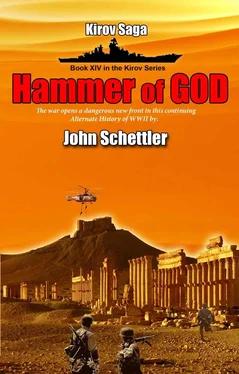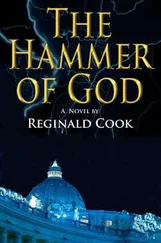John Schettler - Hammer of God
Здесь есть возможность читать онлайн «John Schettler - Hammer of God» весь текст электронной книги совершенно бесплатно (целиком полную версию без сокращений). В некоторых случаях можно слушать аудио, скачать через торрент в формате fb2 и присутствует краткое содержание. Жанр: Альтернативная история, на английском языке. Описание произведения, (предисловие) а так же отзывы посетителей доступны на портале библиотеки ЛибКат.
- Название:Hammer of God
- Автор:
- Жанр:
- Год:неизвестен
- ISBN:нет данных
- Рейтинг книги:4 / 5. Голосов: 1
-
Избранное:Добавить в избранное
- Отзывы:
-
Ваша оценка:
- 80
- 1
- 2
- 3
- 4
- 5
Hammer of God: краткое содержание, описание и аннотация
Предлагаем к чтению аннотацию, описание, краткое содержание или предисловие (зависит от того, что написал сам автор книги «Hammer of God»). Если вы не нашли необходимую информацию о книге — напишите в комментариях, мы постараемся отыскать её.
Hammer of God — читать онлайн бесплатно полную книгу (весь текст) целиком
Ниже представлен текст книги, разбитый по страницам. Система сохранения места последней прочитанной страницы, позволяет с удобством читать онлайн бесплатно книгу «Hammer of God», без необходимости каждый раз заново искать на чём Вы остановились. Поставьте закладку, и сможете в любой момент перейти на страницу, на которой закончили чтение.
Интервал:
Закладка:
He gave the matter some thought, reading over the proposed travel itinerary with some interest. It spoke to his youth, hopping from one wild desert airstrip to the next as he leapfrogged across Africa. He had first seen Egypt and Sudan as a very young man of 24 years. There he had served in the 21st Lancers under Kitchener and seen the wonders of the ruins at Luxor. This intimation of some new discovery in the southern desert of Egypt tugged at him, and fired his imagination, just as Tovey had intended. Yet what could be there that was of any importance to the fate of the nation as Tovey implied? It simply made no sense. He had a mind to summon Tovey home at once, but his eye kept straying over all the other signatures.
The message had been deemed so secret that it could not be transmitted over normal channels. It had been flown all the way to England on a much needed Wellington bomber, and Tovey suggested that, on the return leg, two or three more might make the journey to Egypt in compensation. And as if to head off Churchill’s first inclination to send a man like Foreign Secretary Eden in his place, the message stressed that the nature of discovery was so volatile, and of such weighty importance, that no one other than himself could be privy to the matter-not the war cabinet, nor any other minister of the government, not the Admiralty, nor Michael and his archangels. While that seemed completely preposterous, it nonetheless appealed to his ego on one level.
He took a long look around the stuffy confines of his war room office, and the matter was settled. He was determined to go and see what was brewing in Egypt for himself. After all, it was the central front in the war insofar as England was concerned. If nothing else, he would learn much about the real situation there, and be able to get a grip on the necks of all his senior commanders and get them marching in the direction he wanted.
The journey was every bit as exciting as it was arduous, though no mention was made of it at home. Churchill’s schedule was made up as always, and a list of fictional meetings was posted to make everything seem as though he was there and about his business as usual. He determined to fly first to Britain’s newly won Atlantic outposts in the Canary and Cape Verde Islands, and have a brief chat with Somerville regarding the situation in French West Africa and Casablanca. From there he would fly to Takoradi where a squadron of newly arrived Hurricane fighters were to accompany three Wellington bombers for the journey east across Africa. He eventually landed in Khartoum again, smelling the air of the Sudan for the first time in decades. It was a balm to his soul, and filled him with the energy that was often characteristic of his endeavors when he was fired up like this.
After a brief rest they flew on to Wadi Halfa, right on the Egyptian southern border with Sudan, where Churchill transferred to a smaller Blenheim for the final leg of his journey. It was only then that he was informed the destination would not be Alexandria, but the distant desert oasis of Siwa.
The scene of the crime, he thought. What could be there that would be of any import? He knew there was a ruined old town there, and little more than bleached mud huts baked in the desert sun to an ochre hue. They were actually built from a material called Karshif, which was a mixture of salt and clay worked by the ancient Berbers. Palm trees graced the otherwise barren terrain, in stark contrast to the jagged remnants of stone ruins and dilapidated towers. When he finally got there, however, his eye would have no time to wander among the crumbling, roofless mud walls of the abandoned ruins about a solitary weathered hill. There, stretched out for what seemed to be miles on end, was the footprint of a large military formation.
Siwa had been the site of an ancient oracle at the temple of Amoun that dated from the 26th Dynasty. It was there that Alexander the Great came to be anointed “Son of Amoun,” and Protector of Egypt, but there was another man waiting to meet the Prime Minister who would rightfully usurp that title now, Brigadier General Kinlan. With him were the host of conspirators who had arranged this meeting, Wavell, O’Connor, and Admirals Tovey and Cunningham.
“Well met,” said Churchill, hefting his meager traveling bag. “Never has a man gone so far, with so little, for so many!” They all had a laugh at that, warmly shaking the Prime Minister’s hand. It was there, within that very hour, that Churchill’s life was forever changed, when he learned that the units assembled here had come an even greater distance to make this fateful rendezvous, from decades hence, brave soldiers from a distant future returned to Britain in her hour of greatest need. It was the most shocking and exhilarating moment of his life, but before that day ended, he had been helped up onto the massive metal back of a Challenger II, and taken for a thrilling ride through the assembled ranks of the 7th Brigade.
And after that, nothing was ever the same.
Amazingly, Churchill took to the notion of time travel with great interest and enthusiasm. He had been a long time reader, and was now a personal friend of the famous English science Fiction writer H. G. Wells. In fact, he would later borrow the phrase “The Gathering Storm” for the title of his opening volume on the war, a phrase that was originally penned by Wells in his novel War of the Worlds. The Prime Minister was also much influenced by Wells, shaping several ideas about the relationship of the governed state to its citizens around the writer’s work.
“This is classic science fiction,” he said, “something that old H.G. Wells himself might have dreamt up with his Time Machine. I am not ashamed to say I have read every word that man has ever written, and could pass an exam on his fiction, but seeing his ideas take such a formidable shape, and at such a desperate juncture in this war, is most astonishing. What a mighty sword we have here in this brigade!”
Churchill had read Wells’ story, The Land Ironclads, in 1903 about 100 foot long machines equipped with remote controlled guns and able to carry troops of riflemen. “The captain… had look-out points at small ports all round the upper edge of the adjustable skirt of twelve-inch iron plating which protected the whole affair,” wrote Wells, and Churchill had embraced the concept as a hearty early proponent of tank development. Now he saw his Land Ironclad realized in a way that would have dazzled the mind of Wells himself.
“Who knows,” he said jubilantly. “Perhaps old HG. is one of your own, slipped through some other crack in time to lay out all these stories of days to come.”
After the exhilaration and amazement, the meeting then finally settled down to what must be done now with the gift of iron and steel sent to them from afar. Tovey was pleasantly surprised to learn that Churchill would not take much convincing.
“You were completely right to insist on this meeting here,” said Churchill, “and to keep this force segregated from the rank and file of Wavell’s army. I know in time that may change, but for the moment this must all be considered a matter of the most urgent and darkest secrecy. No one else must know of this, not even the war cabinet, or God forbid, anyone in Parliament. The knowledge is simply too shocking for the common man to hold in the palm of his hand. It would unhinge the world and haunt the dreams of men and women who would not understand it, even as it will likely fire my own imagination as to how we can put this mighty champion to the best good use.”
Wavell and O’Connor shared the plan they had devised, the reason the Brigade had assembled here at Siwa, and the operation soon to be launched against the Italians at Giarabub. Churchill agreed that it was a sound plan to place this mighty axe right at the edge of Rommel’s neck.
Читать дальшеИнтервал:
Закладка:
Похожие книги на «Hammer of God»
Представляем Вашему вниманию похожие книги на «Hammer of God» списком для выбора. Мы отобрали схожую по названию и смыслу литературу в надежде предоставить читателям больше вариантов отыскать новые, интересные, ещё непрочитанные произведения.
Обсуждение, отзывы о книге «Hammer of God» и просто собственные мнения читателей. Оставьте ваши комментарии, напишите, что Вы думаете о произведении, его смысле или главных героях. Укажите что конкретно понравилось, а что нет, и почему Вы так считаете.












